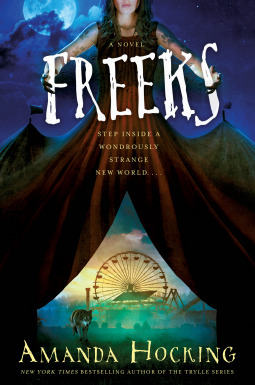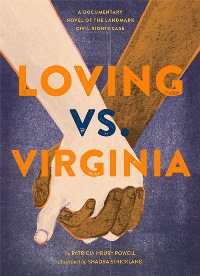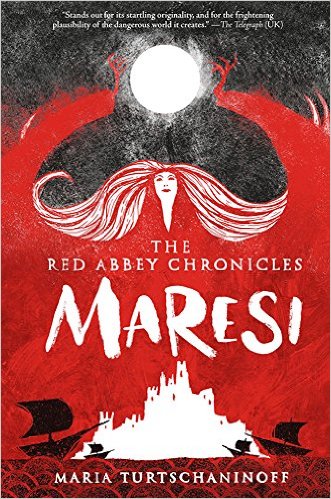2018 School Spending Survey Report
Teens Review “Loving vs. Virginia,” Amanda Hocking’s Latest, and More
From historical fiction to fantasy, the genres in 2017's first crop of teen-reviewed books run the gamut. The Kitsap YA Group doesn't hold back on their thoughts about Jeff Giles's The Edge of Everything, Patricia Hruby Powell's Loving vs. Virginia, and more.
 GILES, Jeff. The Edge of Everything. Bloomsbury. Jan. 2017., Tr $ 18.99. ISBN 9781619637535. Gr 9 Up–This book is thoughtful and caring. I would really want you to read it as well. There is some romance and by just reading it, you can tell that the main characters will devote their lives to each other. This book has great adventures and thoughtful ideas. And it can make you explore your imagination. All I can say is: YOU should READ this BOOK. I loved the cover. But I can’t tell if they are the three main characters from the book, or just random people. But I love that the title is made out of snow and is popped out. Also the flames of fire on the edges. It really ties in with the book. I really loved the beginning of the book, it made me want to keep reading and NEVER put down the book as it got better and better. The characters were great. Especially when I thought Zoe's dad was actually dead! It is full of awesomeness!!!—Grace F., 12
GILES, Jeff. The Edge of Everything. Bloomsbury. Jan. 2017., Tr $ 18.99. ISBN 9781619637535. Gr 9 Up–This book is thoughtful and caring. I would really want you to read it as well. There is some romance and by just reading it, you can tell that the main characters will devote their lives to each other. This book has great adventures and thoughtful ideas. And it can make you explore your imagination. All I can say is: YOU should READ this BOOK. I loved the cover. But I can’t tell if they are the three main characters from the book, or just random people. But I love that the title is made out of snow and is popped out. Also the flames of fire on the edges. It really ties in with the book. I really loved the beginning of the book, it made me want to keep reading and NEVER put down the book as it got better and better. The characters were great. Especially when I thought Zoe's dad was actually dead! It is full of awesomeness!!!—Grace F., 12  HOCKING, Amanda. Freeks. St. Martin's Griffin. Jan. 2017. Tr $18.99. ISBN 9781250084774. Gr 9 Up– Step inside to a carnival ride filled with carnies. The carnies full of suspense, excitement, and twists and turns. The cover is awesome. I like the detail and how the show tent is the girl's dress. I completely loved this book. The best part was the plot and characters. There are so many twists and turns it is ridiculous and the change of events is outstanding. The characters are unique. They have supernatural powers, which is amazing. Totally worth your time.—David L., 17 LA VALLEY, Josanne. Factory Girl. Clarion. Jan. 2017. Tr $17.99. ISBN 9780544699472.
HOCKING, Amanda. Freeks. St. Martin's Griffin. Jan. 2017. Tr $18.99. ISBN 9781250084774. Gr 9 Up– Step inside to a carnival ride filled with carnies. The carnies full of suspense, excitement, and twists and turns. The cover is awesome. I like the detail and how the show tent is the girl's dress. I completely loved this book. The best part was the plot and characters. There are so many twists and turns it is ridiculous and the change of events is outstanding. The characters are unique. They have supernatural powers, which is amazing. Totally worth your time.—David L., 17 LA VALLEY, Josanne. Factory Girl. Clarion. Jan. 2017. Tr $17.99. ISBN 9780544699472.  Gr 9 Up–Roshen is forced to leave her home and family to work in a factory. She must discover how to act in this situation and how to find her way back home. I did not like the cover. It is very plain and boring. It does not have a good color scheme and did not make me want to pick it up. It mildly reflects the story, but it could definitely be improved upon. The darkness does reflect the bad conditions of the factory, but the cover is almost entirely black, which does not lend itself to the book genre. It made me think more of a scary horror story. Roshen, the main character, is depicted on the cover, but not in a realistic way. The black factory is suggesting bad working conditions, but Roshen is smiling and looking out a window. The cover would be better if it focused on the poor working conditions of the factory Roshen was forced to work in by being clearer that the conditions were not favorable at all. The cover could have been much more eye-catching. Factory Girl did not have any aspects that were very compelling. This book was not a terrible book, it just needed more force pushing it. It felt more like the draft of a book than a book itself. It gave the impression of weakness and hesitation. The writing style was stilted. The book was not very interesting in general, although it has the potential to be. The subtitle for the book is "the work is tough- but Roshen is tougher". This is set up to be the premise of the book, but Roshen did not strike me as a very strong person at all. She was forced to go to the factory to work, and hardly even complained or tried to find a different solution. She didn't work for better working conditions. All she wanted to do was go home and get married. She was not focused on her own well-being. These are not traits of a strong character. Roshen seemed to be relying on others too much. She needed to be more of an individual to be a strong character, as the subtitle and book summary suggests that she is.—Olivia C., 15
Gr 9 Up–Roshen is forced to leave her home and family to work in a factory. She must discover how to act in this situation and how to find her way back home. I did not like the cover. It is very plain and boring. It does not have a good color scheme and did not make me want to pick it up. It mildly reflects the story, but it could definitely be improved upon. The darkness does reflect the bad conditions of the factory, but the cover is almost entirely black, which does not lend itself to the book genre. It made me think more of a scary horror story. Roshen, the main character, is depicted on the cover, but not in a realistic way. The black factory is suggesting bad working conditions, but Roshen is smiling and looking out a window. The cover would be better if it focused on the poor working conditions of the factory Roshen was forced to work in by being clearer that the conditions were not favorable at all. The cover could have been much more eye-catching. Factory Girl did not have any aspects that were very compelling. This book was not a terrible book, it just needed more force pushing it. It felt more like the draft of a book than a book itself. It gave the impression of weakness and hesitation. The writing style was stilted. The book was not very interesting in general, although it has the potential to be. The subtitle for the book is "the work is tough- but Roshen is tougher". This is set up to be the premise of the book, but Roshen did not strike me as a very strong person at all. She was forced to go to the factory to work, and hardly even complained or tried to find a different solution. She didn't work for better working conditions. All she wanted to do was go home and get married. She was not focused on her own well-being. These are not traits of a strong character. Roshen seemed to be relying on others too much. She needed to be more of an individual to be a strong character, as the subtitle and book summary suggests that she is.—Olivia C., 15  POWELL, Patricia Hruby. Loving vs. Virginia: A Documentary Novel of the Landmark Civil Rights Case. Chronicle. Jan. 2017. Tr $ 21.99. ISBN 9781452125909. Gr 8 Up–Richard and Mildred fell in love, and being different races, they struggled to marry and live life the way they should have been able to. They broke the law and even through all the court battles they faced, they were determined to fight for love. I felt the cover very much reflected the contents. It depicts two hands of different races clasped. The fact that it actually happened in real life was the most compelling part. It was a very well written story. The plot really flowed and it was interesting. I also liked how I learned a lot about history while reading this. I also liked how it was written in poem form. But it was truly astonishing to learn that this story was true and it was amazing to read about what that couple had to go through to follow their dreams.—Veronica C., 13
POWELL, Patricia Hruby. Loving vs. Virginia: A Documentary Novel of the Landmark Civil Rights Case. Chronicle. Jan. 2017. Tr $ 21.99. ISBN 9781452125909. Gr 8 Up–Richard and Mildred fell in love, and being different races, they struggled to marry and live life the way they should have been able to. They broke the law and even through all the court battles they faced, they were determined to fight for love. I felt the cover very much reflected the contents. It depicts two hands of different races clasped. The fact that it actually happened in real life was the most compelling part. It was a very well written story. The plot really flowed and it was interesting. I also liked how I learned a lot about history while reading this. I also liked how it was written in poem form. But it was truly astonishing to learn that this story was true and it was amazing to read about what that couple had to go through to follow their dreams.—Veronica C., 13  TURTSCHANINOFF, Maria. Maresi. Abrams. Jan. 2017. Tr. $17.95. ISBN 9781419722691. Gr 8 Up–Maresi has found a safe haven in the Red Abbey, a place where she is free from the world that nearly destroyed her. She feels safe and loved there, but when a new girl, Jai, joins the Abbey and brings danger to their doors, her safe haven could crumble far too easily. I was disappointed in just how generic this novel was. When I picked it up, I was quite excited, mainly due to comparisons to Ursula K. LeGuin and the descriptor of "feminist fantasy". Both of these made it sound quite appealing. However, Maresi is no Left Hand of Darkness or Earthsea novel. It is no Tamora Pierce novel either. A cast of strong (if dull) female characters does not a feminist fantasy novel make. Not if the characters, as mentioned before, are unutterably dull and cliché. When it comes to the aforementioned descriptor, I cannot help comparing this novel to those written by Pierce, and it just doesn't wind up living up to the legacy of feminist fantasy that Tortall left. Maresi is no Kel, nor is she a Alanna. She's just a dull, boring character. While comparisons to Tortall might seem unwarranted for such a different book, Maresi doesn't hold up well to any other feminist fantasy I can think of or remember loving, such as Alison Croggon’s “Pellinor” and Patricia C. Wrede’s “Enchanted Forest Chronicles.” If anything, it feels like a dull rehash of Kate Constable’s “Chanters of Tremaris” trilogy, a series I never particularly liked much. The most compelling aspect of Maresi is that the world is actually quite interesting. It's unique, with interesting societal dynamics. The religion of the world, which plays a huge part in the plot, is quite well-thought-out, and lends an air of mysteriousness and quiet to the story, something which I appreciate. The calm yet quietly intense tone is highly underutilized in fantasy, and its use here benefits the novel greatly. It makes the reading experience immersive, and leaves you slightly unsettled for all the right reasons after you've finished. The tone of this novel is truly what makes it memorable, and in that respect, it is lifted far above the usual mediocre YA fantasy crowd. Maresi could have been an excellent book, but instead, it was merely vaguely enjoyable. In all, it was a dull read. Perhaps I'm just nostalgic for the girl-power fantasy novels I grew up with, but this was no “Tortall” novel, and somehow, I feel like Maresi will never stand by Pierce’s heroines in the lineup of great feminist fantasy. And this blandness adds one more reason for me to read more adult high fantasy rather than staying with dull, washed-out YA versions of my second-favorite genre.—Ella W., 17
TURTSCHANINOFF, Maria. Maresi. Abrams. Jan. 2017. Tr. $17.95. ISBN 9781419722691. Gr 8 Up–Maresi has found a safe haven in the Red Abbey, a place where she is free from the world that nearly destroyed her. She feels safe and loved there, but when a new girl, Jai, joins the Abbey and brings danger to their doors, her safe haven could crumble far too easily. I was disappointed in just how generic this novel was. When I picked it up, I was quite excited, mainly due to comparisons to Ursula K. LeGuin and the descriptor of "feminist fantasy". Both of these made it sound quite appealing. However, Maresi is no Left Hand of Darkness or Earthsea novel. It is no Tamora Pierce novel either. A cast of strong (if dull) female characters does not a feminist fantasy novel make. Not if the characters, as mentioned before, are unutterably dull and cliché. When it comes to the aforementioned descriptor, I cannot help comparing this novel to those written by Pierce, and it just doesn't wind up living up to the legacy of feminist fantasy that Tortall left. Maresi is no Kel, nor is she a Alanna. She's just a dull, boring character. While comparisons to Tortall might seem unwarranted for such a different book, Maresi doesn't hold up well to any other feminist fantasy I can think of or remember loving, such as Alison Croggon’s “Pellinor” and Patricia C. Wrede’s “Enchanted Forest Chronicles.” If anything, it feels like a dull rehash of Kate Constable’s “Chanters of Tremaris” trilogy, a series I never particularly liked much. The most compelling aspect of Maresi is that the world is actually quite interesting. It's unique, with interesting societal dynamics. The religion of the world, which plays a huge part in the plot, is quite well-thought-out, and lends an air of mysteriousness and quiet to the story, something which I appreciate. The calm yet quietly intense tone is highly underutilized in fantasy, and its use here benefits the novel greatly. It makes the reading experience immersive, and leaves you slightly unsettled for all the right reasons after you've finished. The tone of this novel is truly what makes it memorable, and in that respect, it is lifted far above the usual mediocre YA fantasy crowd. Maresi could have been an excellent book, but instead, it was merely vaguely enjoyable. In all, it was a dull read. Perhaps I'm just nostalgic for the girl-power fantasy novels I grew up with, but this was no “Tortall” novel, and somehow, I feel like Maresi will never stand by Pierce’s heroines in the lineup of great feminist fantasy. And this blandness adds one more reason for me to read more adult high fantasy rather than staying with dull, washed-out YA versions of my second-favorite genre.—Ella W., 17
RECOMMENDED
CAREERS
The job outlook in 2030: Librarians will be in demand
CAREERS
The job outlook in 2030: Librarians will be in demand
ALREADY A SUBSCRIBER? LOG IN
We are currently offering this content for free. Sign up now to activate your personal profile, where you can save articles for future viewing






Add Comment :-
Be the first reader to comment.
Comment Policy:
Comment should not be empty !!!